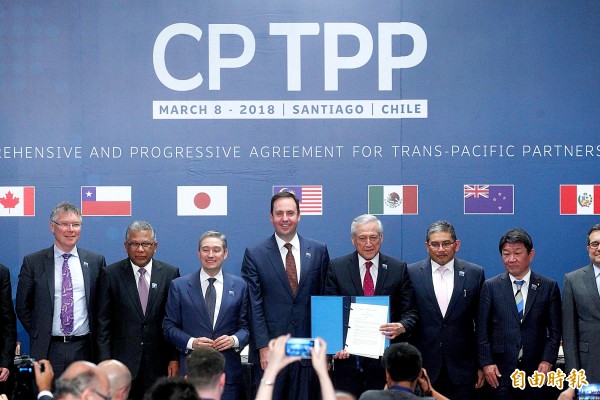《TAIPEI TIMES》 Without US, 11 states ink CPTPP

From left, New Zealand’s Minister for Trade and Export Growth David Parker, Malaysia’s Minister for Trade and Industry Datuk J. Jayasiri, Canada’s International Trade Minister Francois-Phillippe Champagne, Australia’s Trade Minister Steven Ciobo, Chile’s Foreign Minister Heraldo Munoz, Brunei’s Acting Minister for Foreign Affairs Erywan Dato Pehin and Japan’s Minister of Economic Revitalization Toshimitsu Motegi pose for an official picture after signing the rebranded 11-nation Pacific trade pact Comprehensive and Progressive Agreement for Trans-Pacific Partnership (CPTPP) in Santiago, on Thursday. Photo: AFP
By Stacy Hsu / Staff reporter, with AFP, SANTIAGO
Eleven nations on Thursday signed a slimmed-down version of the Trans-Pacific Partnership (TPP) trade agreement, moving to lower tariffs just as US President Donald Trump raised them after withdrawing from the deal.
The TPP, which would have represented 40 percent of the global economy and nearly one-quarter of its trade, was left for dead after Trump pulled out to pursue his “America First” agenda, but the revamped deal, now known as the Comprehensive and Progressive Agreement for Trans-Pacific Partnership (CPTPP), is still a significant achievement and a victory for openness, its supporters said at the signing ceremony in Santiago, Chile.
The pact includes Australia, Brunei, Canada, Chile, Japan, Malaysia, Mexico, New Zealand, Peru, Singapore and Vietnam, together representing 13.5 percent of the global economy.
The 11 states form a market of 500 million people, greater than that of the EU.
In Taipei, the Ministry of Foreign Affairs yesterday said that Taiwan’s participation in the CPTPP would help facilitate further cooperation and economic growth in the region.
Extending congratulations to the 11 member states on their signing of the deal, the ministry said that it signaled a new milestone in economic integration in the Asia-Pacific region.
The ministry said the successful signing was thanks to the remaining member states’ decision in November last year to withhold the ratification of parts of the clauses in TPP after the US’ withdrawal in January last year.
“Given that member states like Japan, Singapore, Malaysia and Vietnam are among Taiwan’s 10 largest trading partners, our participation in the CPTPP would help other members in the region further grow and cooperate with one another and jointly push for prosperity in the Asia-Pacific,” the ministry said.
President Tsai Ing-wen (蔡英文) and Premier William Lai (賴清德) have instructed various government agencies to do their utmost to prepare and garner support for the nation’s membership bid, the ministry said.
“We look forward to seeing the member states complete their domestic ratification process and start accepting new members, including Taiwan, to expand the benefits of the agreement,” the ministry said.
It added that it would continue to demonstrate to the member nations Taiwan’s willingness and the efforts it has made to be part of the region’s economic integration.
The government had sought for years to join the TPP, to no avail. The failure had largely been attributed to the nation’s import ban on US pork containing the leanness-enhancing feed additive ractopamine. Washington often criticizes the ban as not being based on science.
Although Washington’s withdrawal may have eliminated the US pork roadblock, there has been speculation that with Tokyo now at the helm of the deal, Taipei’s import ban on Japanese food products from five prefectures near the site of the 2011 Fukushima Dai-ichi nuclear power plant disaster could impede the nation’s membership bid.
The CPTPP deal was signed just before Trump slapped steep tariffs on imported steel and aluminum, setting up what many allies both at home and abroad warn could escalate into a global trade war.
Former US president Barack Obama’s administration pushed for the TPP as a counterweight to growing Chinese commercial power.
It not only cut tariffs, but required members to comply with a high level of regulatory standards in areas such as labor law and environmental protection.
Fernando Estenssoro, of Chile’s University of Santiago, said snubbing the pact is “a type of suicide” for the US.
Washington’s absence leaves an open path for China — which remains excluded from the deal — as it negotiates separately with Asian nations and New Zealand.
The CPTPP aims to slash tariffs among the 11 members and foster trade to boost growth.
“We’re very proud ... to show the world that progressive trade is the way forward,” Canadian Minister of International Trade Francois-Philippe Champagne said as officials gathered for the signing ceremony.
Felipe Lopeandia, Chile’s top trade negotiator, said the deal would “send a political signal to the world and to the United States itself, that this is a global agreement.”
The pact comes into force 60 days after it is fully ratified by six of the 11 nations.
新聞來源:TAIPEI TIMES

















